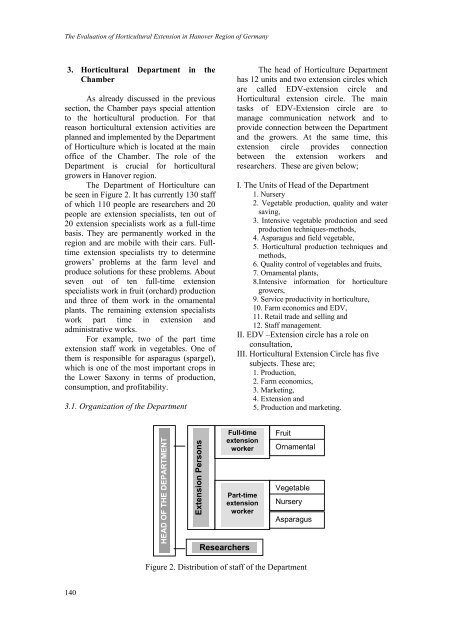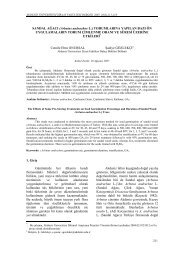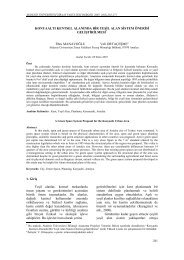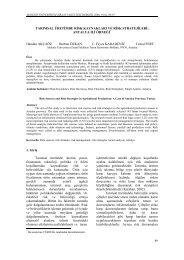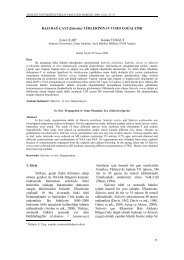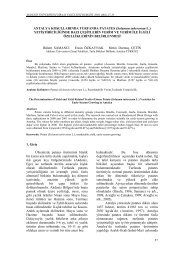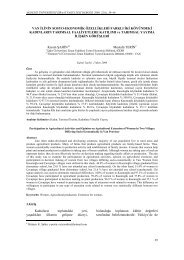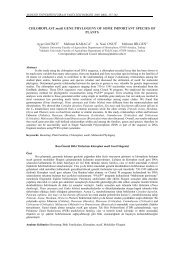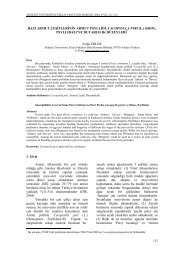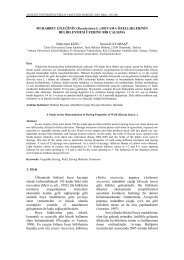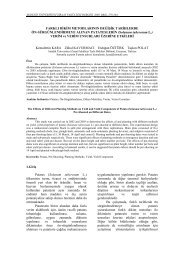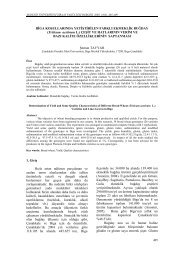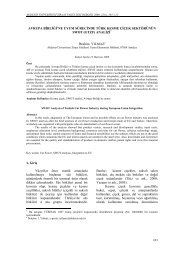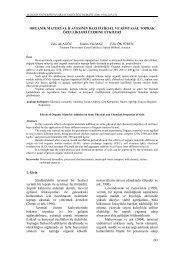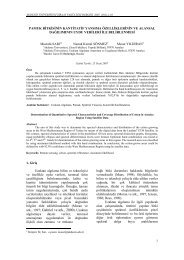The Evaluation of Horticultural Extension in Hanover Region of Germany3. Horticultural Department in theChamberAs already discussed in the previoussection, the Chamber pays special attentionto the horticultural production. For thatreason horticultural extension activities areplanned and implemented by the Departmentof Horticulture which is located at the mainoffice of the Chamber. The role of theDepartment is crucial for horticulturalgrowers in Hanover region.The Department of Horticulture canbe seen in Figure 2. It has currently 130 staffof which 110 people are researchers and 20people are extension specialists, ten out of20 extension specialists work as a full-timebasis. They are permanently worked in theregion and are mobile with their cars. Fulltimeextension specialists try to determinegrowers’ problems at the farm level andproduce solutions for these problems. Aboutseven out of ten full-time extensionspecialists work in fruit (orchard) productionand three of them work in the ornamentalplants. The remaining extension specialistswork part time in extension andadministrative works.For example, two of the part timeextension staff work in vegetables. One ofthem is responsible for asparagus (spargel),which is one of the most important crops inthe Lower Saxony in terms of production,consumption, and profitability.3.1. Organization of the DepartmentThe head of Horticulture Departmenthas 12 units and two extension circles whichare called EDV-extension circle andHorticultural extension circle. The maintasks of EDV-Extension circle are tomanage communication network and toprovide connection between the Departmentand the growers. At the same time, thisextension circle provides connectionbetween the extension workers andresearchers. These are given below;I. The Units of Head of the Department1. Nursery2. Vegetable production, quality and watersaving,3. Intensive vegetable production and seedproduction techniques-methods,4. Asparagus and field vegetable,5. Horticultural production techniques andmethods,6. Quality control of vegetables and fruits,7. Ornamental plants,8.Intensive information for horticulturegrowers,9. Service productivity in horticulture,10. Farm economics and EDV,11. Retail trade and selling and12. Staff management.II. EDV –Extension circle has a role onconsultation,III. Horticultural Extension Circle has fivesubjects. These are;1. Production,2. Farm economics,3. Marketing,4. Extension and5. Production and marketing.HEAD <strong>OF</strong> <strong>THE</strong> DEPARTMENTExtension PersonsFull-timeextensionworkerPart-timeextensionworkerResearchersFruitOrnamentalVegetableNurseryAsparagusFigure 2. Distribution of staff of the Department140
O. ÖZÇATALBAŞThere is a specialist for each subjectin the extension circle. The main task ofHorticultural extension circle is to solveproblems of growers. If the problem can notbe solved at the extension circle, then theproblems are sent to the research institutes.In the region, horticultural researchactivities are implemented by the Universityof Hanover, Ministry of Agriculture, and theChamber which have horticultural researchinstitutes. However, the most importantresearch units belong to the Chamberfollowed by the university and the Ministryof Agriculture.3.2. The Strength of Linkage of the ChamberThe level of the relationships betweenthe farmers and the Chamber can be statedbetween ad-hoc and very strong. Accordingto this strength of linkage, The Chamber hasvery strong linkage with Ministry ofAgriculture of Lower Saxony, ResearchInstitutes of Ministry of Agriculture ofLower Saxony, University of HanoverForeign Research Institutes, ForeignUniversities and Other Chambers ofAgriculture in Germany (Schenk, 1999;Rhein,2000;Ozcatalbas,2000).The Chamberhas also a moderate-strong linkage withFederal Ministry of Agriculture andResearch Institutes of Federal Ministry ofAgriculture (Rhein, 2000).3.3. Fee-Paying System for ExtensionThe extension staffs are responsiblefor the extension activities in their area andusually visit farmers once or twice a weekwith respect to the characteristics of theproduction season. During these visits, theextension staffs make observations andconducts-interviews with growers. Thus theextension staffs have opportunity to see theproblems of farmers and determine solutionpossibilities at the farm level. The farmershave to pay membership fees (subscription)as annual basis to extension circle. Inaddition, farmers can ask the subject matterspecialists (SMS) of the Chamber to dealwith their urgent problems. If the extensionworker can solve the problems, he has to bepaid based on the time spent on the farmlevel. Furthermore, farmers can contact withextension staff by telephone and/or internetor farmers visit extension people in his/heroffice to receive agricultural information. Inthese cases again there is no need to pay feeby the farmers to the extension people.4. Training of Trainers and FarmersThe German training system inagriculture, especially practical training isbased on the German dual training system.Training institutions are universities,technical schools, DEULA institutes(Agricultural Teaching Centres), nationaland regional research institutes, etc.One of the key factors inimplementing extension is regular trainingwhich is fundamental to effective extension(Hayward, 1990). The regular training hasvery special role in the extension. InHanover region, training of trainers(extension staff) and farmers areimplemented by the Chamber. Trainingseminars oriented to farmers are organisedin various topics. These seminars generallylast 2 days, but some of them last one day orbetween 3 and 5 days. Farmers have to beregistered to participate these seminars andhave to pay seminar’s fee. The seminars aregenerally organised between January andFebruary, because agricultural activitiesbetween these dates are relatively low. Thetopics of seminars are crop selling,promotion, advertising, marketing, theprogram of Electronic Data Processing(EDV-Electronische Daten Verarbeitas) forbeginners internet-basic level, how to use(EDV) plant protection, horticulturalproduction techniques, social security andemployment, garden-landscape building,holidays information for women, studenttrips to international green week etc.5. Training of Farmers’ ChildrenThe training of farmers’ children(young farmes or future farmers) is carriedout by the Horticultural Department at themain office of the Chamber via internet andpublications. For this purpose, the Club of141


